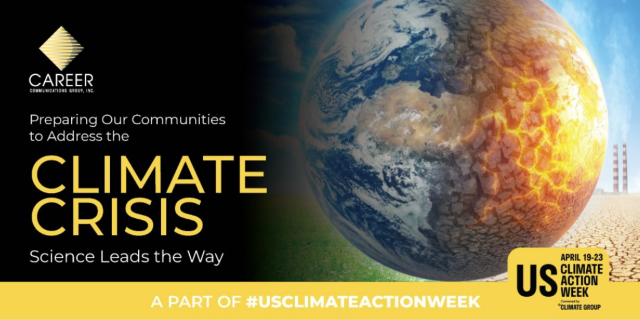
It’s Earth Day and to mark US Climate Action Week, Career Communications Group, the publisher of Hispanic Engineer magazine, hosted a panel discussion on how communities can begin to address the climate crisis with science and technology leading the way. Anthony Kinslow II, the founding CEO of Gemini Energy Solutions, moderated the discussion.
Speakers on the panel included: Brig. Gen. David Turner, who retired from active duty in 2014. As South Atlantic Division commander, Gen. Turner oversaw the planning and construction of projects to protect America’s water resources and enhance the environment. Dana Clare Redden is CEO of Solar Stewards, and Dr. Regan Patterson is an environmental engineer and environmental justice researcher at Regan Patterson Consulting. Click here to watch on YouTube.
In related news, the University of California, Los Angeles (UCLA) released a study as state lawmakers consider Governor Gavin Newsom’s budget proposal, which includes $1.5 billion to zero-emission vehicle expansion.
To reach Gov. Newsom’s net-zero emission vehicle (ZEV) goal by 2035, officials must put equity goals at the forefront of the state’s ZEV strategy, according to new research by UCLA Luskin Center for Innovation.
The study, An Agenda for Equity-Centered Clean Transportation, will help establish equity metrics and principles to inform ZEV policy from the ground up.
“As California transitions to a zero-emission transportation system, it needs a robust and multifaceted agenda for equity-centered clean transportation policies,” said J.R. DeShazo, director of the Luskin Center for Innovation at UCLA, which conducted the study. “Pursuing this agenda of recommendations elevates and builds equity into the next generation of California’s clean transportation policies.”
The study underscores that the past decade of clean transportation policies has not equally benefited all Californians. Instead, low-income communities hit hardest by pollution have been largely left behind in the green transition – disparities that threaten to impact communities of all income levels through climate change. Policymakers must design and pursue a deliberate, overarching policy and regulatory framework to send zero-emission vehicles to low-income areas at scale, researchers determined.
The research was commissioned by the Los Angeles Business Council Institute and aided by a working group of key community advocates, business leaders, and policymakers who helped inform the findings.
“The climate crisis threatens the lives and health of millions of Californians, and policymakers need to build from the ground up taking thoughtful, evidence-based action to protect our communities,” said Mary Leslie, president of the LABC. “These recommendations provide an important foundation to create equitable policies, build stronger communities, and achieve our clean transportation goals.”
The greatest hurdle to meeting environmental goals appears to be directing clean vehicles to moderate- and low-income drivers who are more likely to own older, emissions-heavy vehicles. In response, researchers recommend pursuing reforms to lower the purchase price of new and used zero-emission vehicles, subsidize vehicle financing, and reduce the cost of both charging infrastructure and the electricity or fuel itself.
“History tells us that equity doesn’t happen by accident. It requires deliberate, proactive measures to create fair outcomes, no matter your zip code,” said Bahram Fazeli, director of research and policy at Communities for Better Environment. “Our state’s zero-emission vehicle strategy must consider the importance of equity from the ground up. These recommendations make clear what must be done.”
A key recommendation is to ensure public and private zero-emission fleets are first deployed to disadvantaged communities. From parcel delivery vehicles to school buses and police cruisers, these fleets can help clean air in disadvantaged communities. Policymakers can drive these changes through public contracts and licenses, as well as through public-private partnerships.
The research also recommends expanding investments in e-mobility and e-transit, such as electric scooters and bikes, to bridge these gaps.
“‘Equity in every decision is the foundation of California’s recently released ZEV Market Development Strategy,” said Tyson Eckerle, deputy director of Zero Emission Vehicle Market Development in the California Governor’s Office of Business and Economic Development. “This study is a key building block in turning that foundation into a reality shared by all of California’s diverse regions and communities.”
The state’s zero-emissions benchmark stems from Gov. Newsom’s ambitious September 2020 executive order, which set a goal to make all in-state sales of new passenger cars and trucks zero-emission by 2035. All medium- and heavy-duty vehicles should be zero-emission by 2045, the order says.
The U.S. Army Corps of Engineers has been tasked with…
Brown and Caldwell, a leading environmental engineering and construction firm,…
Humboldt State University, one of four campuses within the California…